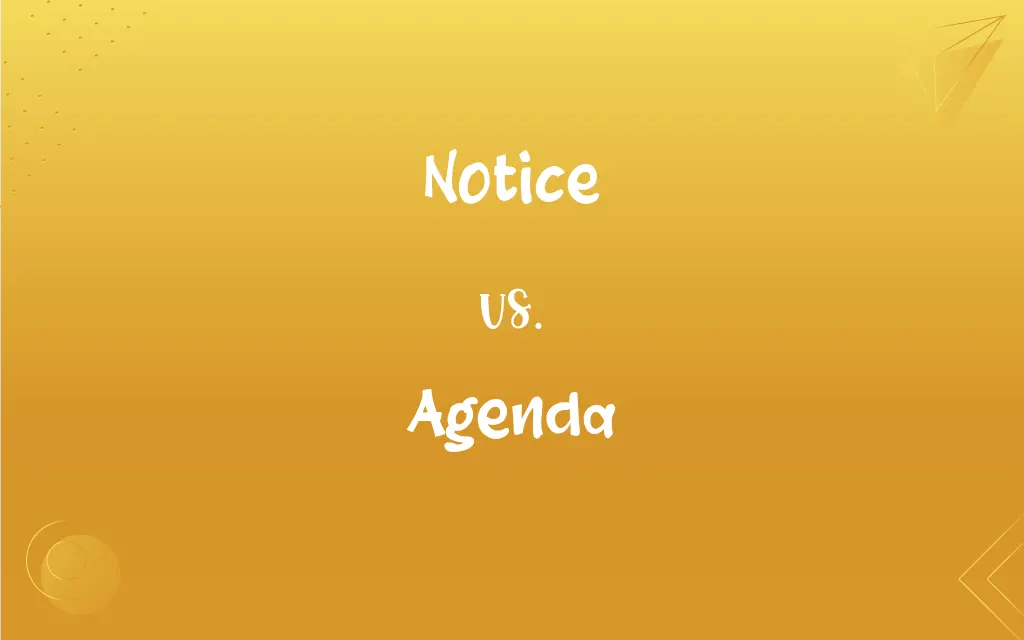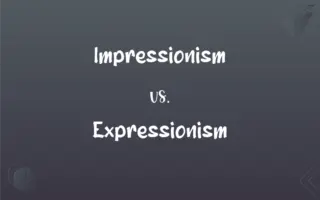Notice vs. Agenda: What's the Difference?
Edited by Harlon Moss || By Janet White || Published on December 1, 2023
Notice is an announcement or attention given to something, while an agenda is a list of items to be discussed or acted upon.

Key Differences
Notice generally refers to the act of informing or alerting someone about something specific, often requiring attention or action. Conversely, an agenda is a structured outline or plan, typically detailing the items for discussion or action in a meeting.
A notice is intended to draw attention or give information, often in a broad sense, while an agenda serves as a roadmap for a meeting or event, outlining specific topics and objectives.
Notices are often used to communicate important information to a group of people, like changes in policy or upcoming events. Agendas, on the other hand, are used to set the focus of a meeting, ensuring that all necessary topics are covered.
In a professional setting, a notice might be circulated to inform employees about a meeting, whereas the agenda for that meeting would detail the subjects to be discussed during the meeting.
The format of a notice is usually more flexible and can be conveyed through various means like emails, memos, or posters, while agendas typically follow a more structured format, often listed in chronological or priority order.
ADVERTISEMENT
Comparison Chart
Purpose
To inform or alert
To outline topics for discussion or action
Format
Can be informal or formal
Usually formal and structured
Usage Context
Broad, for general information or alerts
Specific, for meetings or events
Time Sensitivity
Often used for timely alerts
Scheduled, relating to a specific meeting or event
Required Response
May or may not require a direct response
Often involves active participation or discussion
ADVERTISEMENT
Notice and Agenda Definitions
Notice
Attention or observation.
Her talent came into notice during the school play.
Agenda
A list of items to be discussed.
The meeting's agenda included budget allocations.
Notice
A formal announcement.
The notice on the board announced the office timings.
Agenda
A plan of things to be done.
His agenda for the day involved three important meetings.
Notice
Legal notification.
She filed a notice for the court hearing.
Agenda
A political or organizational plan.
The party's agenda focused on environmental issues.
Notice
A warning or intimation.
He received a notice to vacate the apartment.
Agenda
A hidden motive.
She suspected his offer to help had an ulterior agenda.
Notice
Public information.
The notice in the newspaper declared the town hall meeting.
Agenda
A schedule for a meeting or event.
The conference agenda was packed with interesting talks.
Notice
The act of noting or observing; perception or attention
That detail escaped my notice.
Agenda
A list of things to be discussed in a meeting.
Notice
Respectful attention or consideration
Grateful for the teacher's notice.
Agenda
A program of things to be done or considered
"King's broadening of the civil rights agenda to include issues of class, income, and employment" (James Carroll).
FAQs
Can a notice be informal?
Yes, notices can be informal or formal depending on the context and audience.
How are notices usually distributed?
They can be circulated via email, memos, posters, or public announcements.
What is an agenda?
An agenda is a list or plan detailing topics for discussion or action, typically in a meeting.
Is an agenda always related to meetings?
Primarily, but it can also refer to any structured plan or list of actions.
Is setting an agenda important for meetings?
Yes, it helps in keeping the meeting focused and efficient.
Who prepares an agenda?
Usually, the meeting organizer or chairperson prepares the agenda.
Can a notice require a response?
Some notices, like legal notices, do require a response, but others might not.
What is a notice?
A notice is an announcement or warning given to inform or alert people about something.
Should an agenda be timed?
Timing each item can help in managing the meeting effectively.
What typically features in an agenda?
An agenda features items for discussion, decisions to be made, and action points.
Are notices legally binding?
Some, like eviction notices or legal summons, are legally binding.
What's the difference in tone between a notice and an agenda?
Notices can vary in tone, while agendas are generally neutral and factual.
Can a notice be retracted?
Yes, especially if new information emerges or circumstances change.
Is a notice always written?
Most commonly, but it can also be conveyed orally in some contexts.
Can agendas change?
Yes, agendas can be adjusted or updated as needed.
Is an agenda public information?
It can be, especially for public or corporate meetings.
How specific should a notice be?
It should be clear and concise, providing necessary information.
Can a notice be verbal?
Yes, though written notices are more common for record-keeping.
Are agendas subject to approval?
In formal settings, agendas may need approval before a meeting.
Can anyone suggest items for an agenda?
Typically, participants can propose items before the agenda is finalized.
About Author
Written by
Janet WhiteJanet White has been an esteemed writer and blogger for Difference Wiki. Holding a Master's degree in Science and Medical Journalism from the prestigious Boston University, she has consistently demonstrated her expertise and passion for her field. When she's not immersed in her work, Janet relishes her time exercising, delving into a good book, and cherishing moments with friends and family.
Edited by
Harlon MossHarlon is a seasoned quality moderator and accomplished content writer for Difference Wiki. An alumnus of the prestigious University of California, he earned his degree in Computer Science. Leveraging his academic background, Harlon brings a meticulous and informed perspective to his work, ensuring content accuracy and excellence.






































































